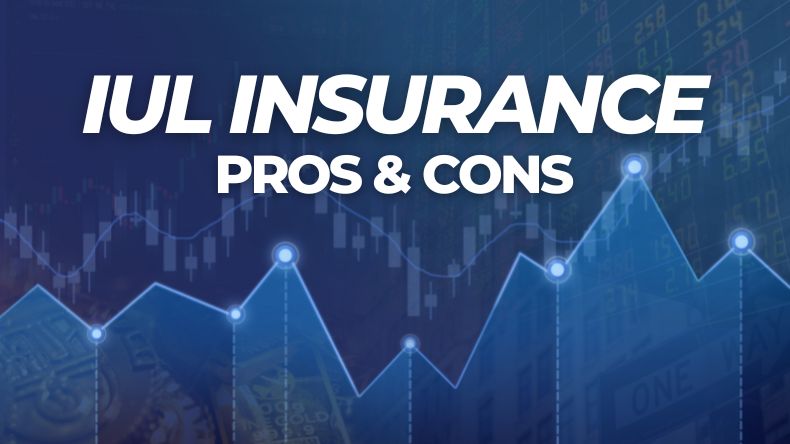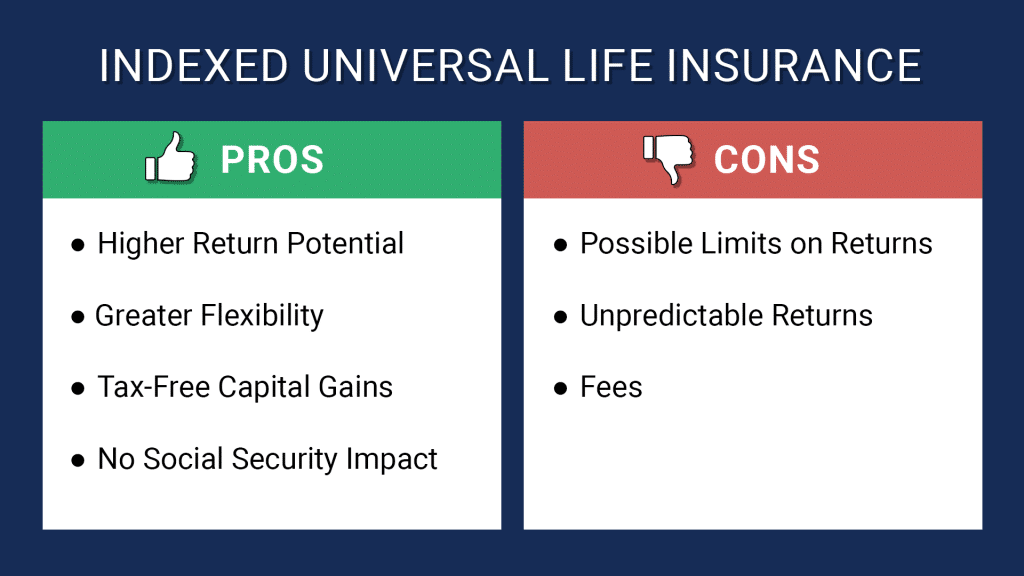All Categories
Featured
Table of Contents
- – How do I compare Indexed Universal Life Calcul...
- – How does Indexed Universal Life Insurance work?
- – How do I choose the right Indexed Universal L...
- – How do I cancel Indexed Universal Life Tax Be...
- – What is the most popular Iul Premium Options...
- – What types of Indexed Universal Life For Ret...
Indexed Universal Life (IUL) insurance policy is a sort of irreversible life insurance policy that combines the attributes of typical global life insurance policy with the potential for cash value development linked to the efficiency of a securities market index, such as the S&P 500 (Long-term IUL benefits). Like other forms of long-term life insurance policy, IUL offers a fatality benefit that pays out to the recipients when the insured dies
Money worth accumulation: A portion of the premium repayments enters into a cash money value account, which earns interest with time. This cash worth can be accessed or borrowed versus during the policyholder's life time. Indexing alternative: IUL policies use the opportunity for cash money worth development based on the efficiency of a stock exchange index.
How do I compare Indexed Universal Life Calculator plans?
As with all life insurance items, there is additionally a collection of threats that insurance policy holders must understand prior to considering this sort of policy: Market danger: One of the main risks related to IUL is market risk. Since the cash worth development is connected to the efficiency of a stock exchange index, if the index executes improperly, the cash value may not expand as anticipated.

Adequate liquidity: Policyholders must have a secure financial situation and be comfortable with the premium settlement demands of the IUL plan. IUL enables versatile costs payments within particular limitations, yet it's crucial to maintain the policy to ensure it achieves its intended purposes. Rate of interest in life insurance protection: People that need life insurance policy coverage and a passion in money worth growth might discover IUL appealing.
Prospects for IUL need to be able to understand the technicians of the policy. IUL might not be the best choice for individuals with a high resistance for market risk, those who prioritize affordable financial investments, or those with more instant financial requirements. Consulting with a certified economic consultant that can provide tailored support is necessary before taking into consideration an IUL policy.
All registrants will certainly obtain a calendar invitation and link to sign up with the webinar using Zoom. Can not make it live? Register anyway and we'll send you a recording of the presentation the next day.
How does Indexed Universal Life Insurance work?
You can underpay or avoid premiums, plus you may be able to change your death advantage.
Money worth, along with potential growth of that worth with an equity index account. An option to allot component of the money value to a fixed passion choice.
Insurance holders can choose the percent allocated to the fixed and indexed accounts. The worth of the chosen index is recorded at the beginning of the month and compared to the value at the end of the month. If the index enhances during the month, passion is included to the cash money value.
The 6% is multiplied by the cash value. The resulting rate of interest is added to the cash value. Some plans determine the index gains as the amount of the adjustments for the duration, while other policies take an average of the everyday gains for a month. No interest is attributed to the cash money account if the index drops as opposed to up.
How do I choose the right Indexed Universal Life For Retirement Income?
The rate is established by the insurer and can be anywhere from 25% to even more than 100%. (The insurance company can likewise alter the get involved price over the lifetime of the policy.) For example, if the gain is 6%, the engagement rate is 50%, and the present cash worth overall is $10,000, $300 is included in the cash worth (6% x 50% x $10,000 = $300).
There are a number of pros and cons to take into consideration prior to buying an IUL policy.: As with conventional universal life insurance policy, the insurance holder can raise their premiums or reduced them in times of hardship.: Quantities attributed to the cash worth grow tax-deferred. The cash money worth can pay the insurance policy premiums, enabling the policyholder to decrease or stop making out-of-pocket costs settlements.
How do I cancel Indexed Universal Life Tax Benefits?
Several IUL plans have a later maturity date than other sorts of universal life plans, with some ending when the insured reaches age 121 or even more. If the insured is still active during that time, plans pay the death benefit (however not typically the cash worth) and the profits may be taxable.

: Smaller sized plan stated value do not use much benefit over regular UL insurance policy policies.: If the index decreases, no passion is attributed to the money worth. (Some policies provide a low ensured price over a longer period.) Other investment vehicles use market indexes as a criteria for performance.
With IUL, the objective is to make money from higher motions in the index.: Since the insurance provider only purchases choices in an index, you're not straight spent in supplies, so you don't benefit when companies pay rewards to shareholders.: Insurers fee costs for handling your cash, which can drain pipes cash value.
What is the most popular Iul Premium Options plan in 2024?

For the majority of people, no, IUL isn't much better than a 401(k) - IUL premium options in terms of saving for retired life. A lot of IULs are best for high-net-worth people searching for ways to decrease their taxed income or those that have actually maxed out their other retired life alternatives. For every person else, a 401(k) is a better investment vehicle due to the fact that it does not lug the high costs and costs of an IUL, plus there is no cap on the amount you may make (unlike with an IUL policy)
While you may not shed any money in the account if the index decreases, you won't earn interest. If the market transforms bullish, the profits on your IUL will not be as high as a typical financial investment account. The high expense of premiums and fees makes IULs costly and significantly less inexpensive than term life.
Indexed universal life (IUL) insurance supplies money worth plus a survivor benefit. The money in the money value account can make interest via tracking an equity index, and with some often designated to a fixed-rate account. Nonetheless, Indexed universal life policies cap just how much money you can accumulate (typically at less than 100%) and they are based on a potentially volatile equity index.
What types of Indexed Universal Life For Retirement Income are available?
A 401(k) is a better option for that objective since it does not lug the high charges and costs of an IUL plan, plus there is no cap on the amount you might make when spent. The majority of IUL policies are best for high-net-worth individuals seeking to lower their taxed earnings. Investopedia does not provide tax, investment, or monetary services and suggestions.
If you're thinking about acquiring an indexed universal life policy, first talk with a financial expert that can clarify the nuances and provide you an accurate picture of the actual capacity of an IUL plan. Make certain you comprehend exactly how the insurance company will compute your rate of interest, revenues cap, and costs that may be analyzed.
Table of Contents
- – How do I compare Indexed Universal Life Calcul...
- – How does Indexed Universal Life Insurance work?
- – How do I choose the right Indexed Universal L...
- – How do I cancel Indexed Universal Life Tax Be...
- – What is the most popular Iul Premium Options...
- – What types of Indexed Universal Life For Ret...
Latest Posts
7702 Iul
Pacific Life Indexed Universal Life Insurance
Universal Index Annuity
More
Latest Posts
7702 Iul
Pacific Life Indexed Universal Life Insurance
Universal Index Annuity